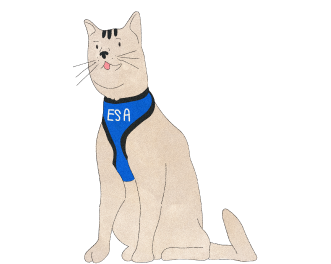What is an Emotional Support Animal (ESA)?
An emotional support animal is a pet that provides comfort and companionship to someone with a psychological, emotional, and/or mental disability. Think of it as a security blanket with four legs and a tail. And while they’re usually either a cat or a dog, they can be other types of animals too. Moreover, they don’t require training to become an ESA–every pet is qualified already.
What is an Emotional Support Dog?
An emotional support dog is a pet that provides therapeutic benefit(s) to their owner through support and companionship to help alleviate symptoms associated with a mental or emotional disability.
Emotional support dogs are the most common type of ESA since dogs help with reducing symptoms of anxiety, depression, and other mental and/or emotional disabilities. Plus, it can’t hurt that they’re pretty darn cute, too.
What’s the Difference Between a Service, Emotional Support, and a Therapy Animal?
To understand the differences in the laws, get to know the difference in these animals. Emotional support animals, therapy animals, and service animals can assist people with a disability, but there are differences in how they do so. These three laws can help distinguish them: Americans with Disabilities Act (ADA), Air Carrier Access Act (ACAA), and Fair Housing Act (FHA).
Pet Vs. Emotional Support Animals: What’s the Difference?
“Are emotional support animals allowed in restaurants? What about pets? Is there even a difference between these two?!” These are questions we get a lot. To answer them properly, we need to first learn about what an emotional support dog is and what makes them different from a pet! A pet is a cute companion animal that entertains their owners and keeps them company. Pet owners get them because they love animals and want a new furry buddy in their lives.ESAs have a job to do, however. They have one giant task: making living with a mental health illness or condition easier. They maintain their owner’s well-being and provide comfort during the really bad days. Ufff — not an easy job, sometimes! People suffering from mental or emotional conditions such as post-traumatic stress disorder (PTSD, anxiety or depression may massively benefit from the companionship of an ESA.
Emotional Support Animal Training

Unlike service animals, HUD does not require any special training for ESAs. However, we strongly encourage you to make sure your pet understands basic commands, behaves well in a public setting and is trained for traveling if you chose to take it on a flight. The more prepared they are, the less stressful it is for you.
Airlines will revoke the privilege to travel with your ESA if your pet has shown aggression to flight staff, yourself or other passengers on a previous occasion.
And landlord’s can deny the accommodation or ultimately file for an eviction if the emotional assistance animal is particularly disruptive, or the tenant fails to take proper measures to ensure that the animal does not bother other tenants.
Both you and your furry friend are going to have a much easier time of it if your best friend is well socialized and well-behaved in public. This way, you can enjoy the privileges of being able to take your ESA with you wherever you go.
Emotional Support Animal Laws
Owners taking advantage of the emotional support animals laws fair housing act ruins it for everyone else.
It is important that anyone considering an Emotional Support Animal letter be aware of the laws that apply to owners and what they should expect from airlines and landlords.
There are two main federal laws applicable to ESAs and their owners, these include the Air Carrier Access Act and the Fair Housing Act.

ESA Housing Letter
If you’re looking to preside with your emotional support animal, you must have the right documentation or you can be denied housing.
Verified ESA owners (owners who have an ESA Housing letter written by a Licensed Mental Health Professional) are allowed by law to live with their ESA free of charge, thanks to the Fair Housing Act.
The Fair Housing Act, commonly known as FHA, requires apartments and housing communities that ordinarily restrict pets to make “reasonable accommodation” for assistance animals.
In order to be protected by FHA law, the ESA owner must have a diagnosed disability and provide documentation, such as your ESA housing letter, to the property owner or housing representative.
With your letter, a landlord has no right to require you to pay extra for your ESA or deny you housing even if it has a no pets allowed-policy. They also cannot question the disability or require the animal to wear identification as an Emotional Support Animal.
They can, however, charge and/or evict you if the animal damages the property or harms others. So again, make sure your pet is trained to behave and respect its surrounding environment.
ESA Travel Letter
As of January 11, 2021, the U.S. Department of Transportation allows each individual airline to determine its own policies and regulations when it comes to emotional support animals. While airlines such as Delta, United, and Air Canada no longer recognize emotional support animals as a type of assistance animal, these air carriers may still permit individuals to travel with their comfort animal as long as the individual pays a pet fee, the way pet owners typically do when traveling with a companion animal. There may, however, be restrictions in place in terms of an animal’s weight, size, or breed, so ESA owners should always contact their airline of choice ahead of time for more information about the air carrier’s policies. Those with concerns can also opt to travel with one of several ESA-friendly airlines that still permit emotional support animals onboard flights. These airlines will require proper documentation (in the form of an ESA letter) in order to confirm that the animal’s presence is required to help with emotional conditions or a mental disability.
Verified ESA owners (owners who have an ESA Housing letter written by a Licensed Mental Health Professional) are allowed by law to live with their ESA free of charge, thanks to the Fair Housing Act.
The Fair Housing Act, commonly known as FHA, requires apartments and housing communities that ordinarily restrict pets to make “reasonable accommodation” for assistance animals.
In order to be protected by FHA law, the ESA owner must have a diagnosed disability and provide documentation, such as your ESA housing letter, to the property owner or housing representative.
With your letter, a landlord has no right to require you to pay extra for your ESA or deny you housing even if it has a no pets allowed-policy. They also cannot question the disability or require the animal to wear identification as an Emotional Support Animal.
They can, however, charge and/or evict you if the animal damages the property or harms others. So again, make sure your pet is trained to behave and respect its surrounding environment.
6 Common Questions about ESA Laws
What If A Landlord Does not Accept My ESA Letter And Charges Me A Pet-Related Fee?
When a person with a disability believes that he/she has been subjected to a discriminatory housing practice, including a provider’s wrongful denial of a request for reasonable accommodation, he/she may file a complaint with HUD within one year after the alleged denial or may file a lawsuit in federal district court within two years of the alleged denial. If a complaint is filed, HUD will investigate the complaint at no cost to the person with a disability. If their case goes to an administrative hearing, HUD attorneys will litigate the case on their behalf. The respondent can be ordered to: Compensate the person for actual damages, including humiliation, pain and suffering. Provide injunctive or other equitable relief. Pay the Federal Government a civil penalty to vindicate the public interest. The maximum penalties are $16,000 for a first violation and $70,000 for a third violation within seven years. Pay reasonable attorney’s fees
and costs.
Can I bring my emotional support animal in the cabin of a commercial aircraft?
Yes. Be sure to check with your airline before your travel date. Even though the Air Carrier Access Act regulates procedures, airlines may require additional information and may have other restrictions you should know about.
Can I take my emotional support animal into restaurants or other public places?
It depends. Unlike service animals who can enter public places, ESAs can only go into establishments that have a pet-friendly policy. Other than that, they are mainly intended to be a companion during flights and housing.
Legitimate ESA Registration
To be clear, emotional support animal registration or emotional support animal certification is not real. You do not need to register your ESA in any database to be a legal emotional support animal owner.
What you need to be a legal ESA owner is simple – an ESA letter provided by your licensed mental health professional.
The letter should include:
- The type of license carried by your licensed mental health professional
- The license numbers
- The issue date of the license
- The state in which the license was issued
- The date on which the letter was written
- The ESA letter should confirm the following information:
- That you are currently a patient of this LMHP
- You are being treated for a disability
- That you are significantly inhibited in performing a major life activity
- That the prescription of an ESA is an integral part of your treatment plan
Service Dog Registration
If you’re confused about what service dog training and certifications are, don’t worry. We’ve come up with these five important facts to help you out. A service animal has to be either a dog or a miniature horse. No exceptions! The service dog training program these animals go through is very exigent. Service dogs have to become desensitized to mundane distractions, such as loud noises, traffic, and children. All service dogs are taught to serve their owner and cater to their disability. This is a crucial part of the service dog training. To become a service dog, canines have to attend at least 120 hours worth of service dog training classes. These classes need to be taken within a 6-month period. Under the Americans with Disabilities Act (ADA), you don’t need to register your service animal. Stay clear from companies charging you for a so-called service animal certification or registration!
Service Cats: Can a Cat be a Service Animal?
We often get asked, “Can a cat be a Service Animal?”. The short answer: Cats CANNOT be service animals. Cats CAN be emotional support animals. According to the American Disability Act (ADA), “Service Animals are defined as dogs that are individually trained to do work or perform tasks for people with disabilities.” There is a special provision written in for miniature horses, but nothing that mentions specifically service cats. However, as mentioned above, cats can certainly qualify as an emotional support animal (with a letter prescribed from a licensed mental health professional), and there is no training and requirements for your furry companion animal.

5 Ways an Emotional Support Animal Can Help You Cope with Your Symptoms
Emotional support animals can help their owners in numerous ways.
A few are listed here:
Why People with Mental Illness
Find it Hard to Ask a Doctor for an ESA
Unfortunately, mental illness still remains a taboo subject for some, and many people find it difficult to address the topic with their doctor. Here at Therapetic, we’re all about breaking the stigma around mental health problems. Talking to your doctor about depression or anxiety should be no different than talking to them about the flu or a stomach ache. So be sure to seek out a therapeutic option, or otherwise you’re ignoring your essential needs for wellness.
Do you qualify for ESA? Click here to find out
Our Customers Love Us
We pride ourselves on providing support throughout the process.
Which is why we’re #1 in the ESA Letter category.
The entire process was very efficient and less time-consuming. My therapist did a great job in assisting me with my case and explaining the details.

I couldn’t be happier with the customer service of CertaPet. They were very considerate and thorough in their evaluation and timely on getting me the paperwork required. I can’t thank you enough!

The process was extremely easy, fast and convenient. Once approved I had my letter in a couple of days in my mailbox and same day in my email. I’m soo glad I have my pet as an emotional support animal. Now I don’t have to worry about being separated from him ever!

See our 191 reviews on ![]()
How to Ask Doctor for Emotional Support Animal Letterms
If you’re receiving treatment from a licensed mental health professional for a diagnosed mental illness or emotional disability, you can ask them to write you an ESA letter. This is a simple process, but it could make a real difference.
With a valid ESA letter, you and your emotional support animal are eligible for legal protections, such as being able to travel with your ESA in the cabin free of charge on commercial flights and living with your ESA in rented accommodation.
An ESA letter should be written on the official letterhead of your doctor or therapist, and state that you have been diagnosed with a mental illness for which you are receiving treatment. It should indicate that your emotional support animal is a part of your treatment plan and necessary for you to carry out daily tasks. It should also contain details of your doctor or therapist’s license to practice in the state you are located in.

Asking your Therapist for an ESA Letter
If your therapist is a licensed mental health professional, they can also issue an ESA letter. The same rules apply: it must be on letterhead paper, must state that you have been diagnosed with a mental or emotional disability and are receiving treatment for it from the letter’s issuer and that ESA is a part of that treatment. It must also contain the issuer’s license number and the date and place where the license was issued.
5 Tips on How to Ask YOUR Doctor for an ESA
Follow these five tips on how to ask doctor for an emotional support animal letter.
Want to know if you are eligible to become an ESA owner?
A quick screening will get you started! TheraPetic, powered by CertaPet, can help you throughout the entire process thanks to our fully qualified Licensed Mental Health Professionals.
Therapetic is Here to Help You Get a Valid Emotional Support Dog Letterr?
If you’re not currently seeing a doctor or a licensed mental health professional, we’re here to facilitate that relationship, and the good news is that it’s very simple!
The first step is to try our free and completely confidential 5-minute screening process. This is designed to see if you may be a good candidate for an ESA. If you are a good candidate for an ESA, Therapetic will connect you with a licensed mental health professional in your state.

How do I know that your website is legitimate and not a scam like so many other websites?
The information and documentation we issue is 100% compliant with federal and state laws. Your personalized letter is issued by a real licensed mental health professional in your state. In fact, each letter contains the documentation where the board can be contacted and verified.
Is CertaPet Legit?
Dedicated to connecting qualified individuals to licensed mental health professionals in their state, we work along with CertaPet, the most trusted ESA Letter service Online. CertaPet’s main goal is to spread the knowledge on emotional support animals and help those in need get the care they deserve. An ESA Letter from CertaPet provides: Recognition that you are a patient on a case-by-case basis under a licensed mental health professional’s care for mental or emotional disabilities. Verification that you are significantly limited by an individual disability, such as depression or a similar condition, affecting your mental well-being. Prescription for an emotional support dog (also known as a companion dog), or other support animal, as a necessary reinforcement for your mental health within 48 business hour.



 Facebook
Facebook LinkedIn
LinkedIn Twitter
Twitter Copy Link
Copy Link

